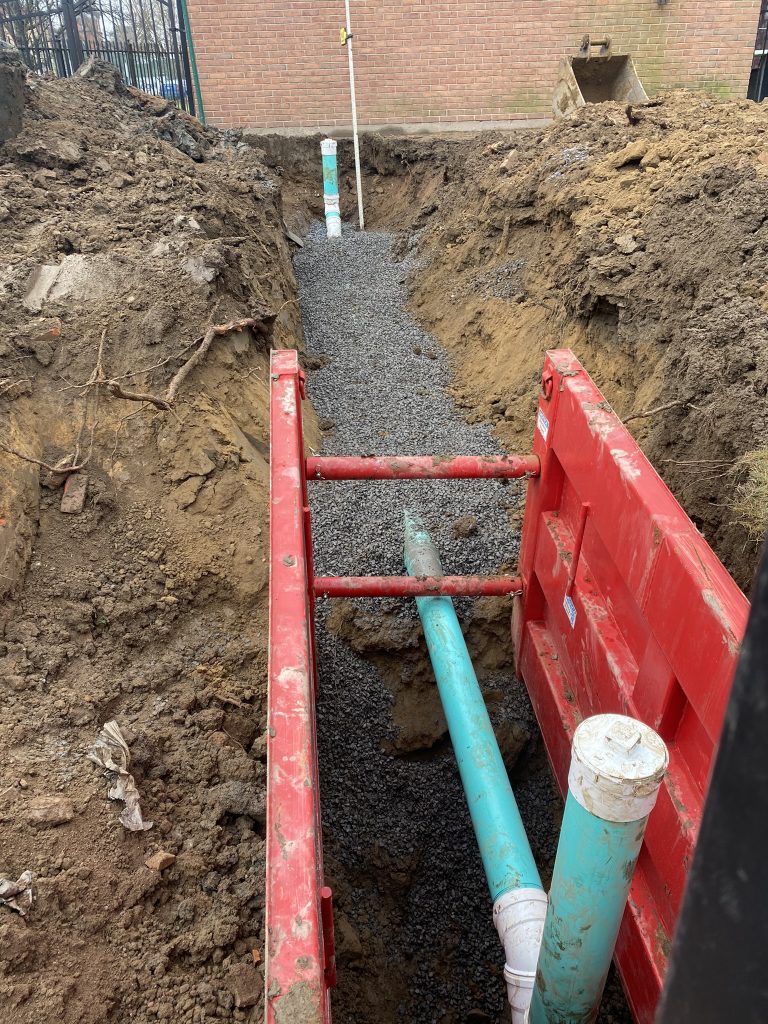Sewer repair involves fixing issues within the sewer system, which can include pipes, drains, and other components that manage wastewater. The sewer line is one of the most important aspects of your home’s plumbing system. A homes sewer line carries wastewater from a home to the city sewer system (through the main sewer line) or into a septic tank. It’s a pipe that is buried deep underground and transports used water from sinks, showers, toilets, washing machines, and other household plumbing fixtures to a treatment facility or a septic system. If there’s a problem with your sewer line, it can cause major problems for your homes plumbing and even damage to your home itself.

Sewer lines are typically made from various materials such as PVC (polyvinyl chloride), cast iron, clay, or concrete. Older systems might have pipes made of materials like clay or cast iron, which can degrade over time and lead to issues. Individual property sewer pipes connect to larger municipal sewer lines, which then transport the wastewater to treatment plants. In the case of septic systems, the sewer line connects to a septic tank where the wastewater is treated on-site.
Regular maintenance and occasional repairs are necessary to ensure proper functioning. Clogs, tree root intrusions, breaks, or collapses in the sewer line can lead to backups and other plumbing issues. Sewer pipes are buried underground to protect them from external damage and to prevent exposure. Problems with sewer pipes can cause significant issues within a property, leading to foul odors, backups, and potential health hazards. Regular inspections and timely repairs or replacements can help prevent major sewer line system problems and ensure the efficient functioning of the sewer system.
Potential Sewer Line Problems
The following are some of the things that can go wrong with a sewer line and that might require sewer pipe repair services.
- Clogs and Blockages: Accumulation of debris, grease, or foreign objects can lead to blockages, restricting the flow of wastewater.
- Pipe Corrosion: Over time a pipe is made of certain materials (like cast iron) can corrode, leading to leaks or collapses in the sewer line.
- Tree Root Intrusions: Tree roots seeking moisture and nutrients can infiltrate sewer lines, causing obstructions, cracks, or breaks.
- Sewer Pipe Bellies or Sags: Sections of the sewer line can sink or develop low points (bellies), causing wastewater to accumulate and potentially leading to blockages.
- Cracks or Breaks: Due to age, shifting soil, or external factors, pipes can develop cracks or breaks, resulting in leaks or backups.
- Joint Leaks: Seals between pipe sections can deteriorate, causing leaks at the joints.
- Invasive Objects: Sometimes, unexpected objects like construction debris or even animals can enter and block sewer lines.
- Corrosion from Chemicals: Harsh chemicals or certain substances flushed down drains can corrode pipes, leading to damage.
- Frozen Pipes: In colder climates, sewer lines can freeze, causing them to crack or burst.
- Poor Installation: Improperly installed sewer lines can result in misalignments, weak connections, or other issues that require repair or replacement.
Sewer repair can be complex and often requires specialized equipment and expertise. Professionals such as those at Valley View Excavating, LLC handle these repairs to ensure they’re done correctly and to prevent further damage to the sewer system. Regular maintenance can also help identify issues early, potentially reducing the need for extensive repairs in the future.
Sewer Pipe Repair
The specific process can vary depending on the nature and extent of the damaged sewer line, but here are the general steps involved:
- Initial Inspection: Technicians use specialized cameras or probes to inspect the sewer line and diagnose the issue. They might also perform tests like smoke tests or dye tests to identify leaks or blockages.
- Assessment and Planning: After identifying the problem, the technicians assess the extent of the damage and plan the repair process. They choose the most suitable repair method based on the specific issue and the condition of the sewer line.
- Repair Methods: Several techniques are commonly used to resolve sewer line problems:
- Sewer Pipe Lining: A flexible liner coated with resin is inserted into the damaged pipe, where it’s inflated and left to harden, essentially creating a new pipe within the old one.
- Pipe Bursting: This method involves breaking the existing pipe while simultaneously pulling a new pipe through. It’s effective for replacing severely damaged pipes.
- Excavation: In cases where the damage is extensive or when other methods aren’t viable, excavation may be necessary to gain access to the pipe. This involves digging to access the damaged section of the sewer line and replacing it with new piping.
- Repair Execution: Once the repair method is chosen, technicians carry out the necessary repairs. This can involve digging, accessing the sewer pipes, and implementing the chosen repair technique.
- Testing and Inspection: After the repair, the system is thoroughly tested to ensure proper functioning. Cameras or probes might be used again to inspect the repaired area and confirm that the issue has been resolved.
- Restoration: If any excavation was required, the area is restored to its original state. This might involve backfilling trenches, reseeding lawns, or repaving surfaces.
- Sewer repair can be complex and often requires specialized equipment and expertise. Professionals handle these repairs to ensure they’re done correctly and to prevent further damage to the sewer system. Regular maintenance can also help identify issues early, potentially reducing the need for extensive repairs in the future.
Valley View Excavating, LLC provides complete CT sewer repair services. We have the experience, equipment, and expertise to handle any sewer excavation job, no matter how big or small. The town of Plainville, Connecticut, where we are located, has even chosen us as their municipal contractor for sewer excavation work.
View our excavation project gallery for photos of our sewer excavation projects.
